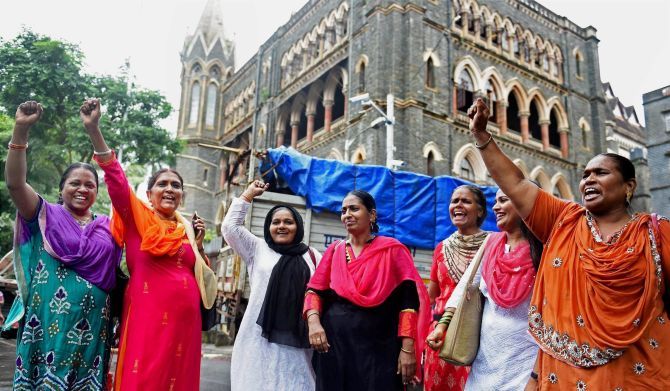Could the Haji Ali dargah verdict be the beginning of the end of all social discrimination -- against women, against Dalits, the low castes and the caste-less, asks Durba Dhyani.

As a child, the word puja (Durga Puja celebrated in Bengal) held the promise of wonderful things -- holidays, new dresses, meeting cousins and friends -- for me.
My parents sent me and and my brother to dadurbari (grandpa’s home) during the puja vacations and the annual vacations. There, we climbed trees, plucked mangoes and ran wild among the corn and mustard fields. Since, throughout the rest of the year, we were cooped up either in our little flat or dismal classroom, those holidays were the only time when we learnt how carefree could childhood actually be.
Grandma would host a Lokkhipujo (prayers to goddess Lakshmi) every year, meticulously smearing cow dung on the compound, arranging fruits and fresh flowers, and placing the humble betel leaf and nut before the photograph of goddess Lakshmi. Once the diya (earthen lamp) was lit, everything looked very beautiful, indeed.
Once I was invited to a friend’s home for Saraswati Puja. As I handed over a few books to be blessed by the goddess of learning and wisdom during the ceremony, the purutmoshai (priest) asked, ‘What is your gotra (clan)?’ I stared blankly. My friend’s family whispered among themselves, wondering what my caste might be. That was perhaps the first instance when I felt being there but left out -- a feeling one gets when allowed into a temple but not inside the sanctum sanctorum.
I came home and enquired about my gotra and caste. My father explained that though we followed Hinduism, we actually belonged to an ancient Tibeto-Chinese tribe and our traditional god was Bathow, symbolised by a cactus plant called Bwrai Bathow.
It was not a comforting explanation. It meant I had no jaati (caste) and no gotra. And why had no one heard of Bathow? Was he, somehow, a lesser god?
I continued to celebrate Durga Puja, but gradually began to look at things from an outsider’s perspective. I still loved Ma Durga and felt saddened when she took leave of us all on Dashami (tenth and the last day of puja), but a small part of me stayed detached -- especially during pushpanjali (culmination of puja) on the eighth day, I felt as an imposter who didn’t really have the right to be there.
But my friends did not know this and continued to invite me to their homes on auspicious occasions.
Once, during Diwali, I helped a friend light diyas, participated in their family prayers and then joined in bursting firecrackers on the street. It was a lovely evening and we were all caught up in joyous celebrations. I noticed, though, that one of our cousins, who had come down from Delhi, was missing in all of the festivities. ‘She’s having her…you know…’ my friend explained.
When realisation dawned, I froze in horror. It was ‘that time’ of the month for me too, and I shouldn’t have been there. Overcome by guilt, shame and fear, I quietly left as soon as I could.
I lay awake late into the night, agonising over what I’d done; the immensity of the paap (sin) I’d committed and the curse I might have unwittingly brought on myself as well as on my friend’s family. I blamed god for not creating everyone equal. Why didn’t my other friends have to worry about caste? Why did only girls menstruate and have to be left out of holy places?
As the years passed, I understood that faith was greater than hollow rituals. It was man that had divided people into the high-born, the low caste, the untouchable and the unclean. I decided to stay away from organised religion and never visited a temple again.
And now, decades later, in a landmark judgment, the Bombay high court has ruled that preventing women from entering the Haji Ali dargah is unconstitutional -- in effect, saying that women are not impure or unclean.
I am more jubilant about this victory today, than of our girls’ achievements in the Olympics. Those were glorious, but individual achievements. This judgment, I truly believe, is a victory for all of mankind. Could this be the beginning of the end of all social discrimination -- against women, against Dalits, the low castes and the caste-less?
Perhaps it is time for me to visit a temple again. And I would love to go the Haji Ali Dargah too -- I’ve heard it’s beautiful.
As it happened with the Shani Shingnapur verdict, reactions to the Haji Ali ruling have ranged from ‘this is a non-issue’ to ‘vested interests are at work.’ Well, there may be vested interests that I am unaware of, but a ‘non-issue’ it is not. Only those denied access, know how it rankles. And it should bother everyone, because in the eyes of the Constitution, we are all equal.
I now eagerly await a similar verdict in case of the Sabarimala temple and hope that it will strike yet another blow to patriarchy and discrimination. A male saint, or a male deity, their vows of celibacy notwithstanding, cannot be an excuse to keep out women from the inner sanctum. Neither can quoting religious scriptures justify such practices.
It maybe a centuries-old tradition to refuse women of child-bearing age entry into temples, but now is the time to question why. What is wrong with reproduction -- isn’t that how every ‘high-born’ priest too came bawling into this world, a mass of flesh and bones and blood?
Some women profess that they don’t mind such customs and love to follow the tradition. It is willingly done and there is no question of discrimination. To them I would say, not everything you love may be wholesome or good. The safety of women is not the responsibility of the police or the government alone. It is our duty to change mindsets and weed out deep-seated prejudices that exist in the garb of religious rituals.
I’m glad that the youth of today have the courage to challenge the regressive practices that we have followed unquestioningly for hundreds of years.
Let the doors of every church, mosque and temple, including those leading to the inner sanctum, stay wide open for everyone. Until then, those of us who are left out will continue to knock and demand entry. It is our constitutional right.
IMAGE: Bharatiya Muslim Mahila Andolan members celebrate after the Bombay high court ruled that women can enter the inner sanctum of the Haji Ali dargah in Mumbai. Photograph: Shashank Parade/PTI Photo.









